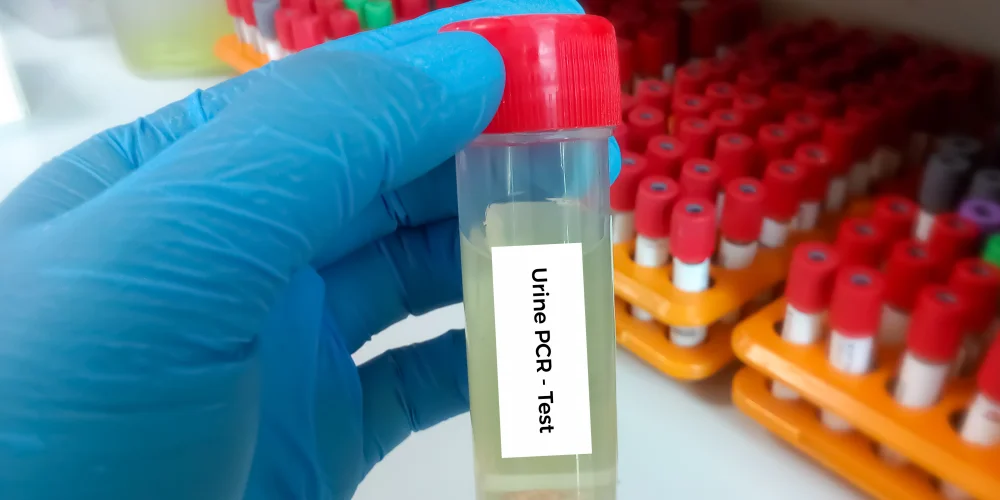Urine Protein-Creatinine Ratio Test
Assessment of Kidney Function and Proteinuria
A Urine Protein Creatinine Ratio (PCR) is a diagnostic test which measures the level of creatinine and protein in urine samples which is a vital indicator performance of the kidney. In analyzing the concentrations of creatinine and protein and creatinine, PCR provides a standard method to assess proteinuria. It can be a sign of kidney damage or ailment. The ratio explains the variations in the concentration of urine, making it a reliable gauge of loss of protein. Higher levels of PCR can indicate diseases such as the chronic kidney condition, diabetes nephropathy or glomerulonephritis. The test is vital to diagnose, monitoring and controlling kidney health, providing the treatment process, and tracking the progress of kidney disease.

When is the Urine Protein Creatinine Ratio Test Prescribed?
The Urine Protein Creatinine Ratio Test is used in a variety of clinical situations which include:
- Assessment of Kidney Function : To evaluate kidney function and detect early signs of kidney damage or disease.
- Diagnosis of Proteinuria : To diagnose conditions associated with excessive protein in the urine, such as glomerulonephritis, diabetic nephropathy, or hypertension-related kidney damage.
- Monitoring Chronic Conditions : For patients with chronic diseases like diabetes or hypertension, to monitor kidney health and manage treatment plans.
- Pre-Operative Screening : As part of routine pre-operative assessments to ensure kidney function is optimal before undergoing surgery.
Preparation for the Urine Protein Creatinine Ratio Test
The procedure for preparing the Urine Protein Creatinine Ratio Test is very simple. The test will require a urine sample which must be taken in a dry, clean container. It’s essential to inform your healthcare professional of any supplements or medications you take, as certain medications can alter the results of the test. In order to maintain a healthy level of hydration, it is recommended; also, avoid drinking excessive amounts of fluids prior to the test to avoid the urine sample from being diluted.
Parameters Considered During Urine Protein Creatinine Ratio Test
The Urine Protein Creatinine Ratio Test is a test that evaluates the performance of several important parameters in assessing kidney function. It evaluates the level of Protein Concentration in the urine. the presence of high levels could suggest kidney disease. It also evaluates Creatinine Concentration which is used as a measure of protein levels. The test measures the ratio of creatinine and protein in urine to assess the severity of proteinuria. Increased ratios may indicate an abnormality in protein levels and could indicate kidney issues, offering useful information on kidney health.
Time Required for Urine Protein Creatinine Ratio Test Report
The Urine Protein-Creatinine Ratio test is fairly quick and efficient. Collection of samples takes just less than a minute, whereas the lab analysis generally takes some hours to one day, based on the workload of the lab. This process is streamlined to ensure quick results that allow for a more accurate evaluation the kidney’s function.
Urine Protein Creatinine Ratio Test Price
The test is offered at Chirayu Super Speciality Hospital, the Urine Protein-Creatinine Ratio Test is priced at Rs 700. This low cost option provides access to the most important diagnostic tests to evaluate kidney function and finding proteinuria.
Booking an Appointment for Urine Protein Creatinine Ratio Test
The Urine Protein and Creatinine Test at Chirayu Super Speciality Hospital in Mira Bhayandar is simple and affordable. Our pathology lab in Bhayandar offers seamless online booking through our website. If you need assistance with reservations or have any questions, our team of professionals is ready to assist. We are dedicated to providing prompt and professional support to ensure your healthcare needs are met efficiently.
What Our Patients Say
Hear from our valued patients about their experiences at Chirayu Super Speciality Hospital and how our care has made a positive impact on their health and well-being.


Professional and caring staff made my testing experience very positive.


Very satisfied with the service and accuracy of my kidney health test.


Friendly staff and quick turnaround for my Urine Protein-Creatinine Ratio results.


Efficient testing process with accessible pricing for kidney function evaluation.


Grateful for the timely results and helpful guidance from Chirayu's team.


Excellent care and professional handling of my Urine Protein-Creatinine Ratio Test.
Frequently Asked Questions
Here, we provide answers to some of the most commonly asked questions to help you better understand our services, policies, and facilities. If you have any additional questions, please do not hesitate to contact us.
A high ratio may indicate proteinuria, which can be a sign of kidney damage or disease.
No special preparation is typically required, but it’s important to inform your healthcare provider about any medications you are taking.
A urine sample is collected in a clean container. No fasting or special dietary restrictions are needed.
The test is highly accurate in assessing kidney function and detecting proteinuria when performed correctly.
Abnormal results should be discussed with your healthcare provider, who will recommend further tests or treatment based on your overall health and symptoms.